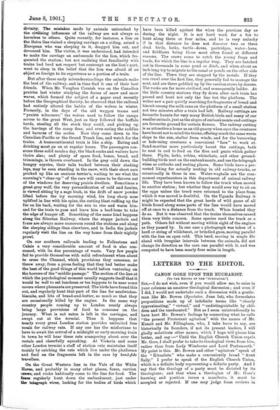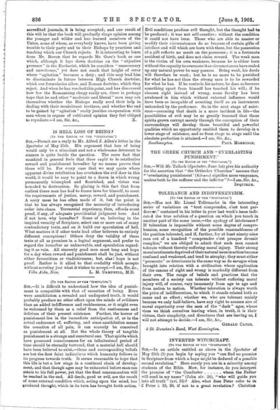LETTERS TO THE EDITOR.
CANON GORE UPON THE EUCHARIST.
rTo THZ EDITOR OP THZ "SPECTATOR.")
do not wish, even if you would allow me, to raise in your columns an amateur theological discussion ; and even if I did, I would not undertake such a discussion with a gentle- man like Mr. Bowen (Spectator, June 1st), who formulates propositions made up of indefinite terms like "closely approximating," "virtual," and " undistinguishable by chil- dren and the uneducated." But as I seem unintentionally to have hurt Mr. Bowen's feelings by connecting what he calls "the present Protestant agitation" with the names of Mr. Kensit and Mr. Fillingham, who, I take leave to say, are historically its founders, if not its present leaders, I will gladly substitute other names, which I hope will please him better, and say:—" Until the English Church Union expels Mr. Gore, I shall prefer to take its theological views from him, rather than from Lady Wimborne and Lord Portsmouth." My point is this. Mr. Bowen and other " agitators " speak of the "Ritualists." who make a conveniently broad "Aunt Sally." I prefer to speak of the English Church Union, which is a definite body representing a definite party. And I say that the theology of a party must be dictated by its theologians ; and that when a theologian of Mr. Gore's learning and position issues a manifesto, it must he accepted or rejected. If one may judge from reviews in accredited journals, it is being accepted; and one result of this will be that the book will gradually shape opinion among the younger and wilder and less learned members of the Union, some of whom, as everybody knows, have been giving trouble to their party and to their Bishops by practices and teaching which our Church rejects. It is interesting to learn from Mr. Bowen that he regards Mr. Gore's book as one which, although it lays down doctrine on the "objective presence" in the Eucharist, which he considers "unnecessary and unwelcome," yet does not reach that height- of error where " agitation " becomes a duty; and this may lead him to discriminate in future between High Church doctrine, which our formularies allow, and Roman doctrine, which they reject. And when he has reached this point, and has discovered how few the Romanising clergy really are, there is perhaps hope that he and other "moderate and liberal" men may ask themselves whether the Bishops really need their help in dealing with their recalcitrant brethren, and whether the end to be gained by " agitation " really justifies co-operation with men whom in organs of cultivated opinion they feel obliged







































 Previous page
Previous page